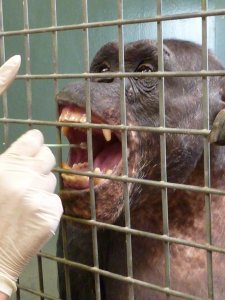Chimpanzees trained to help DNA research
23 September 2009
Geneticists at Leicester University are receiving willing assistance from chimpanzees at Twycross Zoo. The chimps have been trained to enable keepers to take their DNA samples with cheek swabs.
Dr Richard Badge, of the University’s world renowned Department of Genetics, is studying ‘mobile DNA’ in the genomes of humans and other primates. The genome gives accurate information on the genetic makeup and genetic history of the animal. This valuable information will then enable the studbook keeper to determine who can be mated with whom and who their parents are. This will assist with the breeding programme by decreasing the possibility of inbreeding.
 Originally when Dr Badge and his team started the sampling programme
at Twycross, they liaised with the Zoo vet, Nic Masters, to take mouth
swabs from chimpanzees that had been anaesthetised for routine
veterinary procedures. Kris Hern, the Deputy Head of African Apes and
Training Co-ordinator at Twycross Zoo, trained the chimpanzees to be
swabbed conscious.
Originally when Dr Badge and his team started the sampling programme
at Twycross, they liaised with the Zoo vet, Nic Masters, to take mouth
swabs from chimpanzees that had been anaesthetised for routine
veterinary procedures. Kris Hern, the Deputy Head of African Apes and
Training Co-ordinator at Twycross Zoo, trained the chimpanzees to be
swabbed conscious.
Dr Badge welcomed this opportunity to get more regular samples from more of the chimpanzees, since many of them, being quite young and very healthy, have never been under general anaesthetic and would hopefully not need to be for several years.
The chimpanzees that have been trained to allow Kris to take DNA swabs and animals making such a valuable voluntary contribution to science are Kip, William, Peter and Samantha. Choppers, Noddy, Tojo, Ricky, Flyn, Josie, Victoria, Jomar and Mwekundu have all provided DNA while they have been anaesthetised for other reasons.
The chimps were trained using operant conditioning (training of a certain behaviour) to get the desired behaviour. The chimps were previously trained to open their mouths for dental checks and general oral hygiene. Once they were happy with this they then became used to the DNA wand and by using this technique, the chimps allowed the swabs to be taken. The training sessions with the chimps are voluntary and the chimps find them mentally and physically stimulating. They look forward to being rewarded for completing the correct behaviour.
Dr Badge said, “The chimps are given grapes as a reward for opening their mouths and the swabs are then taken. Sometimes they come back a little green, but this does not affect our research. We might extract a little grape DNA, but we use highly chimp specific analyses, so it does not interfere.”
Bridget Fry, Animal Health and Research Manager at Twycross Zoo said, “Richard Badge has been working with the vet and the animal team at Twycross Zoo. Kris Hern the animal keeper put in place a training plan with the assistance of the veterinary team to enable her to collect the DNA swabs. The ability to acquire DNA samples from our chimpanzees without a general anaesthetic is a big leap into the future. The information that the DNA samples can give the Zoo means that correct matches with breeding animals can be made within the breeding programmes.”
Bookmark this page